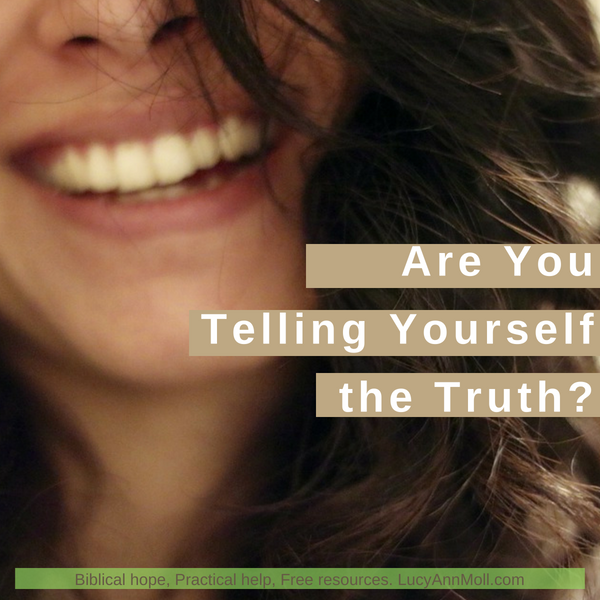
by Lucy | Aug 13, 2018 | biblical counseling, biblical counseling, relationships
Are you telling the truth? This question invites us to consider the validity of our thoughts and to replace the lies we silently tell ourselves with life-giving truth.
Have you noticed this phenomenon and do you believe the lies you tell yourself? Such as:
“I’m not good enough.”
“Ugly. . .that’s me.”
“Idiot, idiot, idiot.”
“No one cares.”
“You’ll never change.”
Sound familiar? We women bash ourselves, don’t we? You. Me. Everyone. An article in The Atlantic estimates that we say thousands upon thousands of words and phrases to ourselves each day. And often what we say about ourselves isn’t true.
Why do we do this? And how can we stop?
The Reason We Lie
Verbal-bashing began long ago. You may recall the story of Adam and Eve in the Bible. All was perfect in the garden until Satan in the form of a serpent slithered on the scene and spoke a lie to Eve, and she believed him. His lie:
You shall not surely die. For God knows that when you eat of it [a tree that God had said was off-limits] your eyes will be opened, and you will be like God, knowing good and evil. Genesis 3:4-5
She believed her enemy, chopped the fruit, and died. Not immediately, but eventually. And she doubted God’s goodness. Shame filled her. Then she and Adam sewed fig leaves to cover up.
When I lie to myself, I am believing my enemy. You too.
A lie I used to tell myself A LOT: “You’re defective, Lucy.” Thankfully, I finally listened to God while in a pit of despair and agreed with him that I am precious. I am precious because he says so.
Begin Speaking Truth
What lies do you tell yourself about yourself? Would you like to replace the lies with the truth about you. And this truth is beautiful, sweet sister.
So here’s how to start telling yourself the truth. These two steps are simple to remember. This is the good part. But if you have a habit pattern of repeating lies to yourself, then you’ll need to have an action plan and enact it.
1. Recognize the lies you say to yourself.
2. Replace the lies with the truth.
In my example of “You’re defective, Lucy,” I replaced this lie with the truth, “God says you’re precious … because you’re his child.” Every time I spoke the “you’re defective” lie to my soul, I then spoke the truth. Over time I caught my lie more and more quickly, and replaced it ASAP. Soon I very rarely said this lie to myself.
So speak the truth about youself. And keep on identifying more lies and replace them with truth. Soon you’ll notice you’ll speak truth in love to yourself and to the people God has put in your path. Your family, your friends, the dog sitter, the Walmart cashier, a stranger.
Let the words of my mouth and the meditation of my heart
be acceptable in your sight,
O Lord, my rock and my redeemer. Psalm 19:14
COUNSELING BY SKYPE/FACETIME
Lucy has Skype-counseled women and families throughout the United States and the world, including China, Germany, the UK, Sweden, Paraguay, and Australia. Read more about biblical counseling in general as well as important information on Skype/Facetime counseling.
Counseling Hearts to Hope,


by Lucy | Jul 10, 2018 | biblical counseling, emotions, relationships, relationships |
WHEN A FRIENDSHIP TURNS SOUTH, what’s the best way to respond?
Two thoughts may come to mind immediately.
1. Drop your friend.
2. Stick it out and repair the friendship.
Which one seems best? What choice have you made in the past when a friend has hurt you? And is there an even better solution than these two?
Friendship Coach Chimes In
Best-selling author Dee Brestin wrote The Friendships of Women, which has sold over a million copies. By this book and her bible studies she has mentored many women through problem friendships as well as loneliness. She writes,
As roses vary from quiet pink to sunny yellow to razzmatazz red, so do women. And when you draw near to a woman, she will often quite willingly open to you petal after petal of fragrant loveliness.
But lurking beneath the glossy, green leaves of roses are surprisingly nasty thorns. After experiencing a few jabs into your soft, tender flesh, you handle roses with more respect. A dedicated rose gardener, one who believes that the glory of the rose more than compensates for the occasional wounds it inflicts, learns to bear the pain and to handle roses in such a way that she is seldom stabbed.
Lovely roses with pointy, blood-thirsty thorns? Even the thought of it freaks me out. Often when hurt, I back away. But is this best? Perhaps I’m protecting myself when I should investigate what’s going on. Maybe she didn’t even know she hurt me.
And what about you? When was the last time you were jabbed by a friend? How did you handle the pain?
When a Friend Did NOT Meant to Hurt You
Very often we feel hurt — and a friendship may be in rocky ground — when something minor happens. Common culprits for hurt feelings include:
A careless remark.
A forgotten invitation.
An unexplained silence.
A last-minute cancelled plan.
A misunderstanding
Hurt feelings – as painful as they are – confirms Scripture, that each of us has a fallen nature. Indeed, we’re all in trouble and need help.
The gospel of Jesus Christ transforms lives. Yes, this good news of his life, death, resurrection, and ascension has an astonishing effect on you and me. It says God first loved us. And we who love Jesus are loved by God. We are his daughters — despite the messy mistakes we make and the friends we hurt. When possible let love cover your hurt. The apostle Peter wrote,
Love covers a multitude of sins. 1 Peter 4:8
But what does this mean?
Yes, God sent his Son to cover our sins and to remove them as far from us as the east is from the west. But this is not likely the meaning here. In this context, Peter is talking about interpersonal relationships among Christians. It’s a dual kind of grace to which he is calling us. In other words, we think charitably of one another and assign the best of motives to the other’s actions.
So don’t sweat “the small stuff.”
Click & Tweet!
SOLUTION: When unintentionally hurt by a your friend, let love cover the hurt and keep your friendship. Tell her, lovingly, that she hurt your feelings. Talk it through. And guess what? You’ll grow closer.
When a Friend Meant to Stab!
What’s a solution when your friend turned enemy, and she actually meant to slice and dice?
Click & Tweet!
Right away, I think of Janna and our bible study fiasco. Many years ago, when I served as women’s ministry director at a church and the team decided to move the day of our study for the upcoming semester, Janna had a behind-the-scenes fit and told a mutual friend. You see, she highly valued the women’s bible study but the new day didn’t work for her. And I was hurt by her gossip.
I never meant to leave her out. However, the team also had failed to survey the women from the previous semester about days.
After a difficult conversation where Janna and I each confessed where we went wrong, our friendship survived. In fact, the team decided to have two bible studies that year.
Tough but needed: forgiveness!
SOLUTION: Find a female biblical counselor or mentor at your church to talk through your hurt feelings. Then discuss how to set up a discussion with your former friend. It may be best to have your mentor with you during the discussion. As always, talk with God in prayer before you meet.
An excellent resource is Ken Sande’s The Peacemaker: A Biblical Guide to Resolving Personal Conflict.
as the Lord has forgiven you, so you also must forgive. Colossians 3:13b

Outside my door, I had a rose bush with the most beautiful magenta blossoms. It also had nasty thorns. When stabbed, I don’t take it personally. The rose bush is just being itself. Thorns and all. This is the nature of the rose bush.
So it is with friendships. They are not perfect and never will be.
Click & Tweet!
(And sometimes they are best ended. But that’s another post.)
COUNSELING: Are you hurting from a broken relationship? Contact me for Christ-centered biblical counseling.
Counseling Hearts to Hope,

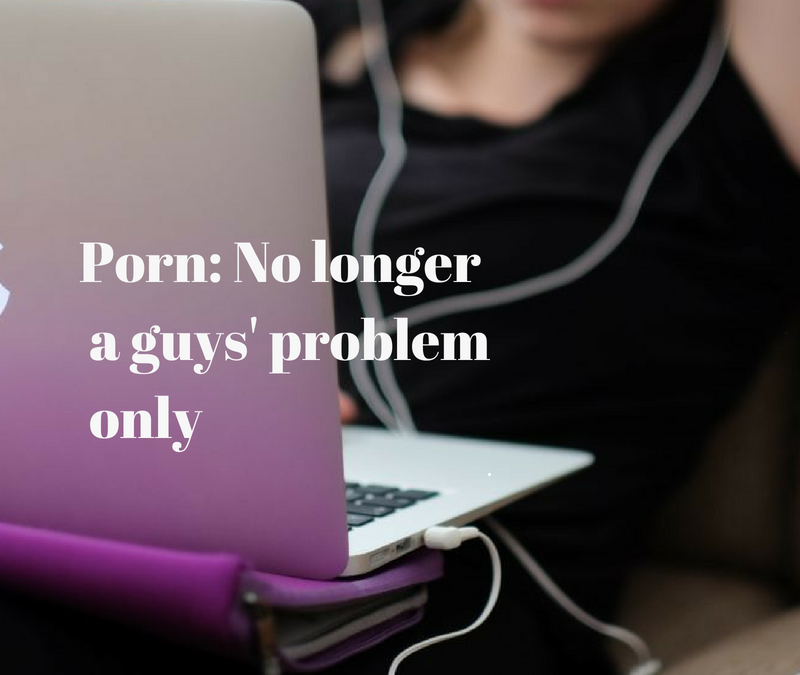
by Lucy | Jun 13, 2018 | biblical counseling, Counselor Resources, emotions, relationships, thoughts |
Women and porn: pornography is not a guys’ problem only. It’s growing exponentially among women, including Christians. In fact, every week or two I counsel yet another woman who struggles with porn.
Skewed Statistics
Truth be told, the statistics on women and porn use fail to tell the full story.
Click & Tweet!
Conservatively, one in five women and girls consume porn. The problem with the numbers starts with defining pornography. Yes, porn includes explicit photos and video. This is hard-core pornography. But there’s other forms!
What about erotica like the 50 Shades of Grey novel? Or how about racy romance novels? Or a Victoria’s Secret catalog? And does sexual fantasy count? Yes, yes, a hundred times yes.
In the words of author-blogger Jessica Harris, a former porn addict:
Pornography isn’t just stored on a computer or found in the pages of a magazine. It buries itself in the mind as memories. In some ways, your own body can serve as a source of pornography.
You may find this blog post uncomfortable to read. Perhaps you’ve already clicked close (and aren’t reading this now). Maybe you even unsubscribed. 🙁 But this topic is essential to know: Your daughters and granddaughters run into pornographic enticements. Every. Single. Day.
Generation Gap!
When it comes to women and porn, there’s a huge difference in porn use and age. Blame the Internet and smart phones.
Says Harris:
Walk into a room with a multi-generational group of men, and you can pretty much assume that the stats on male porn use are going to hold true throughout the generations in the room. Sure, the Baby Boomers grew up on Playboy and the Millennials grew up on smart phones, but still there’s this idea that pornography has been an issue for men for generations.
That is not the case for women.
If I walk into a room with a multi-generational group of women, my first and foremost concern is always to bridge the gap. Because the Baby Boomer women grew up in a time when pornography wasn’t really accessible to them. Nor was it made with them in mind. Their husbands might have been slinking around with magazines stuffed in brown paper bags, but they were not.
Millennial women, on the other hand, came of age at the time of the internet. Not only could we stumble upon a man’s porn stash, now we could access new content all on our own.
Click & Tweet!
Videos even. Without having to subscribe to the adult channels on cable.
Here’s her full post on what the statistics are NOT telling you about women and porn.
Change Is Coming
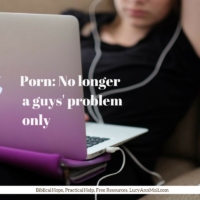 If you hope to gather information about women and porn, you might Google “women and porn” or choose a variation: porn use among women, statistics on women addicted to porn, and so forth. And you’ll get very few hits.
If you hope to gather information about women and porn, you might Google “women and porn” or choose a variation: porn use among women, statistics on women addicted to porn, and so forth. And you’ll get very few hits.
But this is changing.
Among the few resoures is Heath Lambert’s podcast on “Women and Pornography.” You can hear the podcast or read the transcript. There have been a few chapters in biblical counseling books and a booklet or two. I hope to write a book on this subject, God willing. I have a heart for women hooked on porn. Even though it isn’t my story — anxiety and panic attack is part of mine — porn had its hooks in my brother and figures into his binge drinking and also his death. But that’s a story for another time.
Conference Talk on Women and Porn
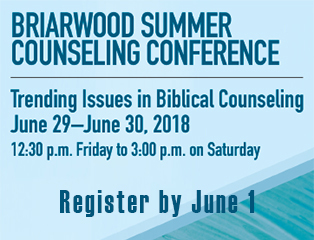 At the end of June I have three talks at Briarwood Summer Counseling Conference: “Trending Issues in Biblical Counseling.” One talk is on self-injury (i.e., cutting and other forms of self-mutilation). And another is on freedom from panic attacks. The third is “Breaking the Bondage of Pornography” (a women only talk). There’s a similar talk for pornography and men.
At the end of June I have three talks at Briarwood Summer Counseling Conference: “Trending Issues in Biblical Counseling.” One talk is on self-injury (i.e., cutting and other forms of self-mutilation). And another is on freedom from panic attacks. The third is “Breaking the Bondage of Pornography” (a women only talk). There’s a similar talk for pornography and men.
I am so happy that I get to speak to female counselors on this topice. With the explosion of internet availability, an ever-increasing number of women are seeking help with porn/masturbation. They often see no way out and have deep guilt and shame. Click here to see the schedule.
Counseling Hearts to Hope,


by Lucy | May 10, 2018 | emotions, relationships, whole health wellness |
Got FATIGUE? Anxiety zaps your energy, messes with your mind and body, leading to fatigue, doesn’t it?
Among the reasons for increasing anxiety today are money worries, poor health, and uncertain times–culturally and politically.. What are other energy drainers you see in the world? In your life? But God knows what you face and is with you. In fact, he desires that you find your security in his strength.
He gives strength to the weary
and increases the power of the weak. Isaiah 40:29, NIV
So snap up these energy-boosting, fatigue fighters from the Bible. Cool?
Come to Jesus
While many of us sleep less than six hours a night according to this study, there’s a better rest when stressed.
Jesus said,
“Come to me, all you who are weary and burdened, and I will give you rest.” Matthew 11:28, ESV
Click & Tweet!
Coming to Jesus is an invitation to trust Jesus personally, not merely believe historical facts about him. At Biblical Counseling Center, we counselors share this biblical truth: Faith is believing the Word of God and acting upon it, no matter how you feel, knowing God promises a good result.
Faith in Jesus leads to the best rest and more energy. Have you tried to pray at bedtime? How has prayer deepened your sleep?
Choose New Thoughts
By the power of the Holy Spirit, you can change the way you think so your thinking lines up with biblical truth. When you have God’s perspective on your troubles, you’ll sense joy and this joy gives way to energy.
When self-centered, you and I may ruminate over what should have been done yesterday or last week, or tomorrow and we feel jittery. Hurrying drains energy and may lead to negative thinking. Here’s a popular resource for transforming your thoughts.
Do you know that when you think well, you feel well and you act well?
It’s true. What you think influences how you think and, in turn, how you feel emotionally and physically AND, in turn, how you act.
Click & Tweet!
For as he thinks in his heart, so is he. Proverbs 23:7, NKJV
From your heart (your inner person) flows your words and behavior.
Above all else, guard your heart, for everything you do flows from it. Proverbs 4:23, NIV

Care for Your Body
God created our bodies and we are meant to love and serve him and our neighbor through the strength he provides and the intelligence and creativity he gives us. The Fit for Life ebook helps you not only lose weight but also reduce get fit spiritually and emotionally.
Here are 5 more tips to boost energy through awesome, fatigue-fighting sleep.
1. Get up and go to bed at the same time every day, even on weekends.
2. Keep your bedroom is quiet, dark, cool, and comfortable.
3. Use your bedroom for sleeping and for sex with your spouse, but not for watching television or doing work.
4. Do not regularly take naps unless you are ill or a new mom short on sleep.
5. Exercise nearly every day, but avoid getting sweaty 4 hours of bedtime. Walking is a great option.
Says biblical counselor and author Wayne Mack,
Recognize the fact that an occasional night when you have difficulty sleeping or getting asleep or staying asleep is quite common and will not seriously harm you unless you let it. Don’t focus on or worry about not getting to sleep. Remember also that on rare occasions God may withhold sleep because he wants you to spend extra time in prayer or meditation.
So no worry, friends. Rather, rest in Jesus, change your thoughts, and take care of your body. Need biblical hope and practical help? Please contact me and I can answer your questions or we can set up a complimentary 15-minute phone consult. Just ask.
Counseling Hearts to Hope,


by Lucy | May 8, 2018 | biblical counseling, relationships
Boundaries: Do they help or hurt? Donna Hart, PhD., listed on Heart2Heart Counselor Directory, considers boundaries in light of the Bible and shares her valuable insights. Her article appeared first here and is used with permission.

We have been hearing so much in the news about the contentious topic of whether our country should have a border wall or not. This strongly debated issue reminds us that we also struggle with whether we should have boundaries. Boundaries are deeply familiar to us. The word boundaries gives us an image of people wearing masks creating a subtle barrier suggesting that people desire to erect boundaries.
On the other hand, the quest for authenticity and the desire to be known cause us to feel constrained by boundaries. We have a desire for personal connection, hinting that we hope for a day when we have more open borders and can know and be known.
But when we look at boundaries in light of the Bible, we note that separation is an essential ingredient of the fallen order and union is an essential feature of the gospel.
Jesus and Breaking Boundaries
Jesus breaks one boundary wall after another so we can live without confinement of walls. He broke the wall between man and Creator by becoming like us.
Ephesians 2:14-15 completes the picture:
For he himself is our peace, who has made us both one and has broken down in his flesh the dividing wall of hostility by abolishing the law of commandments and ordinances, that he might create in himself one new man in place of the two, making peace…
In essence we learn boundaries are not intended to be a dominant feature of relationships. Instead, breaking relational boundaries is fundamental to life in Christ. We are to consider how to move toward one another in love, reconciliation, and forgiveness.
The problem is we set boundaries because we feel violated and seek to protect ourselves.
The boundaries image suggests that the problem is coming from outside of us. Yes problems, expectations, and demands can come at us. But Scripture emphasizes these problems come out of us.
Why “No” Is Hard
Let’s consider some motivations to our difficulty in saying no to things.
• Love does not always mean self-sacrifice. Although this is one expression of love, love can also mean discerning that it is wise to go on a date with your spouse even though your young children don’t want you to go out. Love and wisdom can mean saying no to certain things.
• We don’t want to disappoint others. “Many of us want to please other people and fear disappointing them. This is good and normal. However, this desire can quickly go south and become an idolatrous desire in which our goal is to never disappoint. When our hearts are set on this, the other-oriented command to love is reversed so that it becomes a self-oriented goal to never disappoint, to always have people pleased with us, to never have conflict. What seemed like a desire to not disappoint can mask the desire to have everyone pleased with us. The goal of Christ followers is to love others more than need love from them,” (Ed Welch, Journal of Biblical Counseling, Spring 2004, p20.)
• We over-estimate our own importance and under-estimate God’s care for us. We live as if we existed as lone-rangers, frantically putting out fires as the wind blows sparks to start a new fire. (We might call this self-determined self-sufficiency rather than dependence on God).
• We overvalue how important we are and undervalue the gifts and talents God has given to others to serve us. It is an expression of faith to ask for help because we know we are limited creatures.
Wisdom from the Great Commandment
One of the important parts of wisdom is that it keep us focused on the two great commandments to love God and neighbor. Love can mean that we take a bullet for someone. Or, it might mean we throw them out of the house.
Love is always willing to look at our own hearts first when there is trouble in a relationship.
Love is the reason why we establish a boundaries. It says NO to evil. When possible it puts limits around sin and its consequences. The goal is always to bless enemies and lead them to repentance (Romans 12:14-21).
Boundaries can have both negative and positive characteristics.
Some positive characteristics:
- We erect barriers between ourselves and areas of temptation.
- We maintain boundaries when there are questions about physical safety.
- In extreme situations, we “do not cast our pearls before swine” (Matt. 7:6).
- And we “expel the wicked man from among you” (1 Cor. 5:13).
But we must be careful not to let boundaries become a lifestyle. Also, we must be aware of when we are thinking more about self-protection than love.
The guiding principle to think about is how we can break down the walls between ourselves and others rather than building them.
Counseling Hearts to Hope,

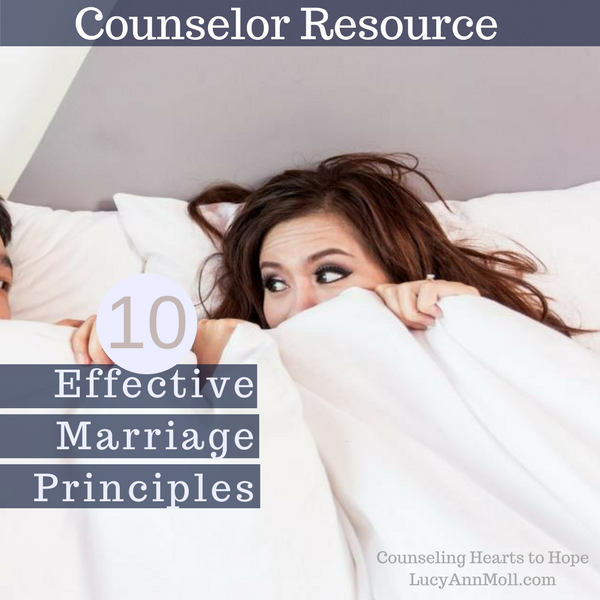
by Lucy | May 2, 2018 | biblical counseling, Counselor Resources, relationships
Effective Marriage Principles help couples know what a God-honoring marriage looks like and assist counselors in counseling hurting couples. Biblical counselor Bob Kellemen includes a link to a one-page PDF document too. Use this Counselor Resource in your own marriage or with the couples you counsel. These 10 effective marriage principles appeared first here on Bob’s website and is used with permission.

Gospel-Centered Marriages
I’ve done a lot of marriage counseling lately. Consistent biblical themes keep arising. I’ve collated them into 10 effective marriage principles for couples and for marriage counseling. The first 8 principles are for both the husband and wife. The final 2 are more specifically for the husband (# 9) and the wife (# 10).
Notice that the last two principles are where a lot of couples and a lot of counselors start—with biblical roles in marriage. Obviously, this is a vital biblical area. Yet, Paul did not start Ephesians with Ephesians 5:21. He started it with gospel-centered principles of salvation, daily Christian living, and relationships. Then, building upon those foundations, Paul moved toward the roles, responsibilities, and callings of husbands and wives. With these 10 effective marriage principles, I’ve sought to do the same—laying out a gospel-centered foundation for marriages and marriage counseling.
I now regularly hand out these 10 effective marriage principles as a one-page guide for the couples that I’m counseling. Feel free to do the same—with small margins, you can make these 10 principles all fit on one page! To prove it, click here for your one-page PDF document. You can send it to others using this shortened link: http://bit.ly/MarriageMC10
Here Are 10 Effective Marriage Principles
1. Keep Putting Jesus First; Keep Loving Jesus Most
Matthew 22:35-38
Love God most with your most: with all your heart, soul, mind, and spirit. Repent of anything you put on the throne above Jesus. Put Jesus before yourself. Put Jesus before your children, your work, your ministry. And put Jesus before your need to be right. Put Jesus first. Love Jesus most.
Click & Tweet!
2. Be Empowered, Changed, and Comforted by the Trinity
Ephesians 5:18; 6:10-18; 2 Corinthians 1:3-8
Paul surrounds his marriage counsel with Ephesians 5:18 and 6:10-18. Spouses change as they are filled by the Spirit (5:18). Marriages change as spouses become more like Christ in Christ’s resurrection power (6:10-18). In your marital hurts, be comforted by the Father of compassion and the God of all comfort (2 Corinthians 1:3-8).
3. Remember Who Your Enemy Is—Satan!
Ephesians 6:11-12
Your struggle is not against your spouse. Your enemy is not your spouse. And your joint enemy is Satan! He wants to destroy your marriage. Join together as spiritual warriors to defeat Satan in the Lord’s mighty power.
4. Take Personal Responsibility
Joshua 1:6-9; Philippians 4:9
You’ve been given more spiritual tools than most people on the planet. Use them. Be mature and courageous and do what God commands. What you’ve heard in the Word—do! Put it into practice!
Click & Tweet!
5. Take the Log Out of Your Own Eye, Confess, Repent
Matthew 7:3-5; James 4:1-4
Don’t focus on what your spouse is doing wrong or not doing right. Remember Matthew 7:3-5 and take the mote out of your eye. Recall James 4:1-4—the real problem in any marriage resides within your heart. Ask God to reveal any sins to repent of. Ask forgiveness of your spouse.
6. Forgive Each Other, Reaffirm Your Love, Comfort Each Other
2 Corinthians 2:5-11
Your spouse will never repent perfectly or be perfect. Still, forgive them as Christ forgives you. Still, reaffirm your loyal love to them as Christ loves you. And still, comfort them as the God of comfort comforts you. Surrender bitterness. Refuse to keep track of wrong. Love. Start afresh every morning as God renews His faithfulness every day.
7. Speak Life Words, Not Death Words to Your Spouse
Ephesians 4:29; Proverbs 18:21
When your spouse hurts or fails you, do this:
1.) Find comfort in Christ.
2.) Seek hope in God.
3.) Take the mote out of your own eye.
4.) Forgive the mote in your spouse’s eye.
5.) Love like Christ. Say this, “My spouse is doing ______. I’m going to respond like Christ by thinking and doing ______.” Speak life-giving, helpful words about and to your spouse—words that nourish them according to their need, that it will benefit your spouse.
8. Put the Interests of Your Spouse First in the Power of Christ
Philippians 2:1-5
When your spouse doesn’t meet your need, be filled by the One who meets your every need—the Trinity Who encourages you, is compassionate with you, values and affirms you. Out of His fullness, choose to fill your spouse by putting their interests before your interests. Put your spouse first.
9. Husband: Shepherd Your Wife with Christ’s Sacrificial Love
Ephesians 5:22-33; 1 Peter 3:7
Husband, your #1 marital calling is shepherding your wife.
Click & Tweet!
Shepherd her like Christ shepherds the church: with death-to-self, sacrificial, agape, mature, other-centered love. Ask God to empower you to live out Ephesians 5:22- 33. Seek to know your wife richly and to treat her with respect as a spiritual heir with you (1 Peter 3:7).
10. Wife: Love Your Husband Like the Church Loves Christ
Ephesians 5:22-33; 1 Peter 3:1-6
Wife, your #1 marital calling is to love your husband with respecting love (Ephesians 5:33). Mature respect encourages strengths, affirms gifts, and gently, humbly challenges wrongs. Mature respect speaks the truth in love to help your husband to keep growing in Christ—because you are for your husband and believe in Christ’s work in him. Ask God to use your godly life to draw your husband closer to Christ (1 Peter 3:1-6).
Click & Tweet!
Counseling Hearts to Hope,















